名词性从句的翻译
名词性从句的翻译

2) 以it作形式宾语的宾语从句 一般按原句顺序翻译,it可不译出
I
made it clear to them that they must hand in their papers before 10 o’clock in the morning. 我明确地告诉他们,论文必须在上午十点之 前交。 Anyhow, old chap, I owe it to you that I am here. 不管怎么说,老伙计,我现在还能站在这儿, 全靠你。
2) 译为类似定语的结构或独立句
But
I knew I couldn’t trust him. There was the possibility that he was a political swindler. 但我知道不能轻信他。他是政治骗子这 种可能性还是存在的。 It does not alter the fact that he is the man responsible for the delay. 迟延应由他负责,这个事实是改变不了 的。
同位语从句
保持原本的语序 译为类似定语的结构或独成一句 加入冒号、破折号和“这样”、
“这一”、“即”等字眼 改变原文的同位语结构,用汉语 的无主句或其他方式译出
1) 保持原本的语序
He
expressed the hope that he would come over to visit China again. 他表示希望能再来中国访问。 As an obedient son, he had accepted his father’s decision that he was to be a doctor, though the prospect didn’t interest him at all. 作为一个孝顺儿子,他接受了父亲的决 定,去当医生,虽然他对这样的前途毫 无兴趣可言。
名词性从句的翻译
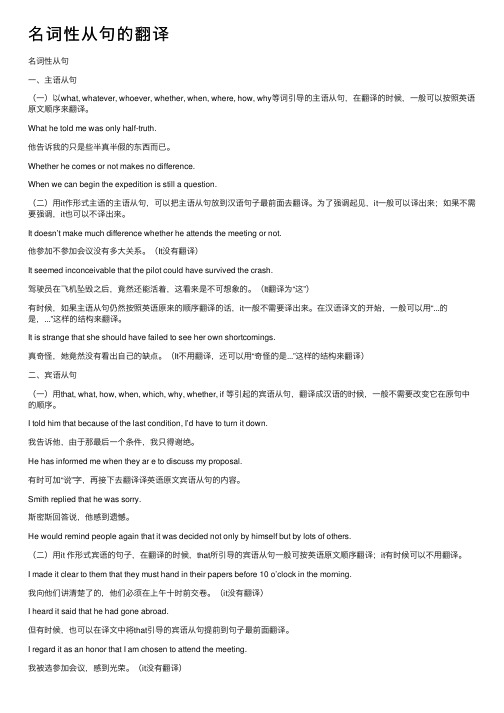
名词性从句的翻译名词性从句⼀、主语从句(⼀)以what, whatever, whoever, whether, when, where, how, why等词引导的主语从句,在翻译的时候,⼀般可以按照英语原⽂顺序来翻译。
What he told me was only half-truth.他告诉我的只是些半真半假的东西⽽已。
Whether he comes or not makes no difference.When we can begin the expedition is still a question.(⼆)⽤it作形式主语的主语从句,可以把主语从句放到汉语句⼦最前⾯去翻译。
为了强调起见,it⼀般可以译出来;如果不需要强调,it也可以不译出来。
It doesn’t make much difference whether he attends the meeting or not.他参加不参加会议没有多⼤关系。
(It没有翻译)It seemed inconceivable that the pilot could have survived the crash.驾驶员在飞机坠毁之后,竟然还能活着,这看来是不可想象的。
(It翻译为“这”)有时候,如果主语从句仍然按照英语原来的顺序翻译的话,it⼀般不需要译出来。
在汉语译⽂的开始,⼀般可以⽤“...的是,...”这样的结构来翻译。
It is strange that she should have failed to see her own shortcomings.真奇怪,她竟然没有看出⾃⼰的缺点。
(It不⽤翻译,还可以⽤“奇怪的是...”这样的结构来翻译)⼆、宾语从句(⼀)⽤that, what, how, when, which, why, whether, if 等引起的宾语从句,翻译成汉语的时候,⼀般不需要改变它在原句中的顺序。
名词性从句翻译
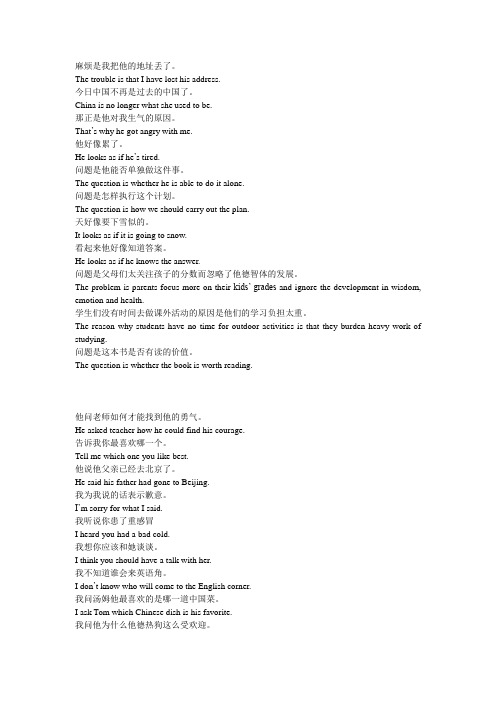
麻烦是我把他的地址丢了。
The trouble is that I have lost his address.今日中国不再是过去的中国了。
China is no longer what she used to be.那正是他对我生气的原因。
That’s why he got angry with me.他好像累了。
He looks as if he’s tired.问题是他能否单独做这件事。
The question is whether he is able to do it alone.问题是怎样执行这个计划。
The question is how we should carry out the plan.天好像要下雪似的。
It looks as if it is going to snow.看起来他好像知道答案。
He looks as if he knows the answer.问题是父母们太关注孩子的分数而忽略了他德智体的发展。
The problem is parents focus more on their kids’ grades and ignore the development in wisdom, emotion and health.学生们没有时间去做课外活动的原因是他们的学习负担太重。
The reason why students have no time for outdoor activities is that they burden heavy work of studying.问题是这本书是否有读的价值。
The question is whether the book is worth reading.他问老师如何才能找到他的勇气。
He asked teacher how he could find his courage.告诉我你最喜欢哪一个。
Tell me which one you like best.他说他父亲已经去北京了。
名词性从句汉译英
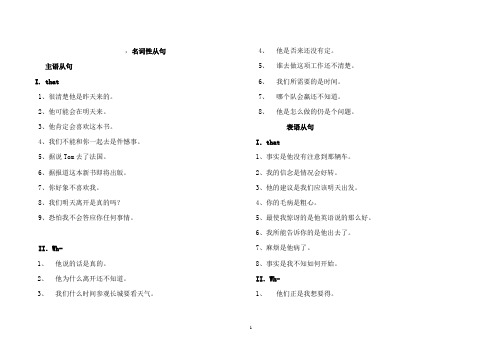
,名词性从句主语从句I. that1、很清楚他是昨天来的。
2、他可能会在明天来。
3、他肯定会喜欢这本书。
4、我们不能和你一起去是件憾事。
5、据说Tom去了法国。
6、据报道这本新书即将出版。
7、你好象不喜欢我。
8、我们明天离开是真的吗?9、恐怕我不会答应你任何事情。
II.Wh-1、他说的话是真的。
2、他为什么离开还不知道。
3、我们什么时间参观长城要看天气。
4、他是否来还没有定。
5、谁去做这项工作还不清楚。
6、我们所需要的是时间。
7、哪个队会赢还不知道。
8、他是怎么做的仍是个问题。
表语从句I.that1、事实是他没有注意到那辆车。
2、我的信念是情况会好转。
3、他的建议是我们应该明天出发。
4、你的毛病是粗心。
5、最使我惊讶的是他英语说的那么好。
6、我所能告诉你的是他出去了。
7、麻烦是他病了。
8、事实是我不知如何开始。
II.Wh-1、他们正是我想要得。
2、问题是它是否值得一做。
3、问提是我们该作些什么来帮助他。
4、问题是谁留下。
5、那就是他出生的地方。
6、我们就是这样分手的。
7、我是你正在找的那个人。
8、这就是我去那的原因同位语从句I.that1、我听到了我们队获胜的消息。
2、他在会上什么都没说的事实使我们惊讶。
3、他打算来的消息使我们高兴。
4、他已经下定学好英语的决心。
5、他当选的消息不是真的。
II.Wh-1、我不知道他什么时候来。
2、你不知道我多么着急。
3、很难回答你提出的我是如何做的问题。
4、我提出的如何邀请他的问题已经得到了解决。
5、你为什么对音乐感兴趣的问题还没回答。
宾语从句I. That clause1,我认为他们学习很努力。
2,他说他将在11日动身。
3,他告诉我医生马上就来。
4,他说他妈妈在读书。
5,他说他的爸爸生于1948年。
6,我恐怕犯了一个错误。
7,我们有把握成功。
8,对不起我错拿了你的钢笔。
II.Whether/ if1,我想知道他明天是否来。
2,我想知道你是否愿意和我一起去看足球赛。
英语八大从句类型例句
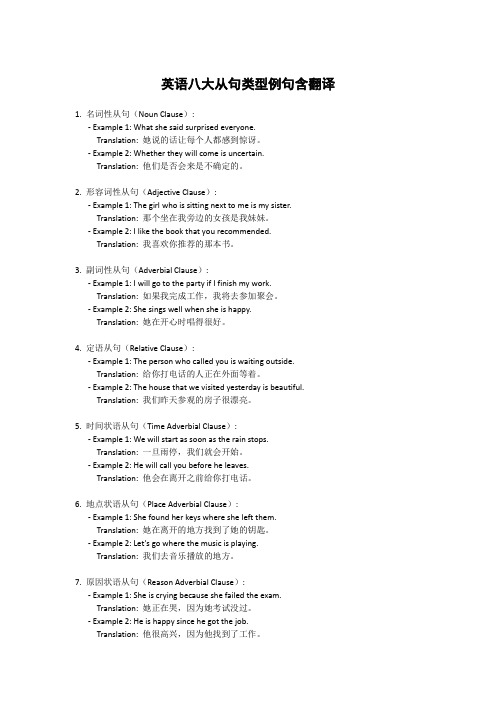
英语八大从句类型例句含翻译1. 名词性从句(Noun Clause):- Example 1: What she said surprised everyone.Translation: 她说的话让每个人都感到惊讶。
- Example 2: Whether they will come is uncertain.Translation: 他们是否会来是不确定的。
2. 形容词性从句(Adjective Clause):- Example 1: The girl who is sitting next to me is my sister.Translation: 那个坐在我旁边的女孩是我妹妹。
- Example 2: I like the book that you recommended.Translation: 我喜欢你推荐的那本书。
3. 副词性从句(Adverbial Clause):- Example 1: I will go to the party if I finish my work.Translation: 如果我完成工作,我将去参加聚会。
- Example 2: She sings well when she is happy.Translation: 她在开心时唱得很好。
4. 定语从句(Relative Clause):- Example 1: The person who called you is waiting outside.Translation: 给你打电话的人正在外面等着。
- Example 2: The house that we visited yesterday is beautiful.Translation: 我们昨天参观的房子很漂亮。
5. 时间状语从句(Time Adverbial Clause):- Example 1: We will start as soon as the rain stops.Translation: 一旦雨停,我们就会开始。
4名词性从句的翻译
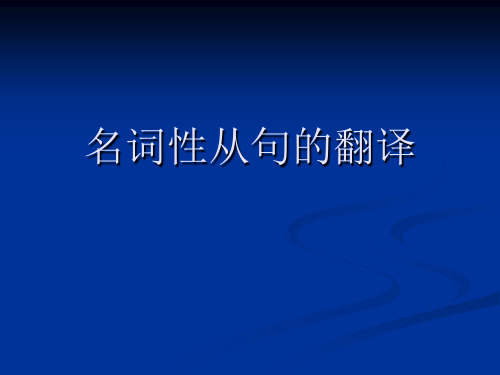
When we can begin the expedition is still a question.
How he is going to do it is a mystery.
(二)用it作形式主语的主语
1997-72
三、表语从句
It seems that it is going to snow. That is why Jack got scolded. The question remains whether we
can win the majority of the people. His view of the press was that the
reporters were either for him or against him.
2002-61
四、同位语从句
belief(相信),fact(事实),hope(希 望), idea(想法,观点),doubt(怀 疑),news(新闻,消息),rumor(传 闻),conclusion(结论),evidence(证 据),suggestion(建议),problem(问 题),order(命令),answer(回答), decision(决定),discovery(发现), explanation(解释),information(消 息),knowledge(知识),law(法律), opinion(意见,观点),truth(真理,事 实),promise(承诺),report(报告), thought(思想),statement(声明), rule(规定),possibility(可能)
I heard it said that he had gone abroad.
名词性从句翻译
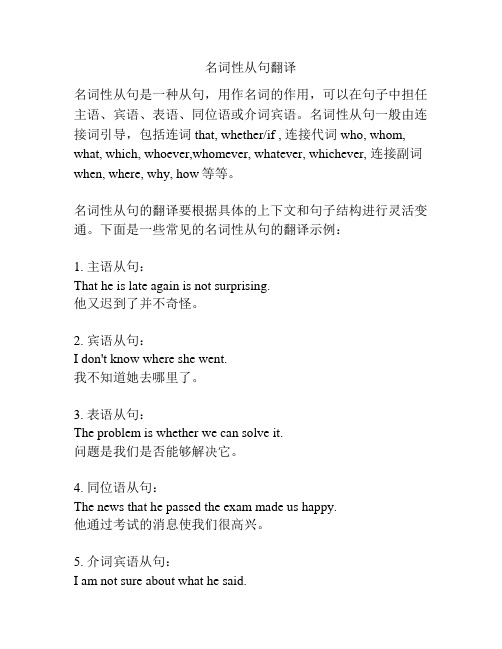
名词性从句翻译名词性从句是一种从句,用作名词的作用,可以在句子中担任主语、宾语、表语、同位语或介词宾语。
名词性从句一般由连接词引导,包括连词that, whether/if , 连接代词who, whom, what, which, whoever,whomever, whatever, whichever, 连接副词when, where, why, how等等。
名词性从句的翻译要根据具体的上下文和句子结构进行灵活变通。
下面是一些常见的名词性从句的翻译示例:1. 主语从句:That he is late again is not surprising.他又迟到了并不奇怪。
2. 宾语从句:I don't know where she went.我不知道她去哪里了。
3. 表语从句:The problem is whether we can solve it.问题是我们是否能够解决它。
4. 同位语从句:The news that he passed the exam made us happy.他通过考试的消息使我们很高兴。
5. 介词宾语从句:I am not sure about what he said.我不确定他说的是什么。
6. 间接引导名词性从句:He asked where I lived.他问我住在哪里。
7. 是否从句:I wonder whether/if she will come to the party.我想知道她是否会来参加派对。
8. 选择性从句:He asked me whether I preferred coffee or tea.他问我是喜欢咖啡还是茶。
9. 宾语从句(陈述句变为疑问句):Do you know what time it is?你知道现在几点钟吗?10. 宾语从句(连接代词):I wonder who is going to pick us up at the airport.我想知道谁会在机场接我们。
课件10 名词性从句的翻译

3) 加入冒号、破折号和 “这样”、“这一”、“即”等字眼
But
considering realistically, we had to face the fact that our prospects were less than good. 但在实事求是地考虑一番之后,我们不得不正 视这样一个事实:我们的前景并不妙。 Influenced by these ethics, the new generation live under the delusion that money does not stink. 受这种道德观念的影响,青年一代生活在这样 一种错觉中,以为金钱总是香喷喷的。
Most
remarkable of all is the fact that each question was decidedly consensus, thus enhancing prospects that the treaty will win approval when it comes up for ratification.
7
宾语从句
以that,
what, how引导的 宾语从句 句
以it作形式宾语的宾语从
1) 以that, what, how引导的宾语从句
一般按原句顺序翻译
I
told him that I had to turn him down. 我告诉他我不得不拒绝他。 Did you hear what I said? 你没听见我的话吗? I told him how appealing I found the offer. 我告诉他,这个机会对我有着多么大的吸引 力。
2) 译为类似定语的结构或独立句
名词性从句的翻译

1.表语从句一般可按原文翻译 Row material is what we are in need of. 原料是我们所需要的东西。 This is why she got in touch with us in the first place. 这是她起初和我们接触的原因。
IV. 同位语和同位语从句
*两种结构 Who kept the door open all night was unknown. 从句位于句首 It‘s a pity that you should go so soon. 从句位原文顺序翻译 What he told me was only half-truth. 他告诉我的只是半真半假的东西而已。 That he finished writing the composition in such a short time surprised us all. 他竟然在这么短的时间内完成作文,令我们很惊 讶。 When we start the work is an important question. 我们什么时候开始工作,这是个很重要的问题。
名词性从句的翻译
Translation of Substantive Clauses
什么是名词性从句? What has happened is no surprise to us. We all know well enough what he is. This is why we don’t like him. The fact that I left him is expectable. 主语从句、宾语从句、表语从句、同位语从句
1.同位语单词和短语的翻译 They two have the same idea. 他们两个都有这种想法。 According to Bill Johns, my doctor, this disease is easy to cure. 根据我的医生比尔的观点,这种疾病很容易治愈。 The negotiation will take place at a hotel, the (可用破折号——) Friendship Hotel. 谈判将在一个宾馆内举行——友谊宾馆。
第12章名词性从句的翻译ppt课件
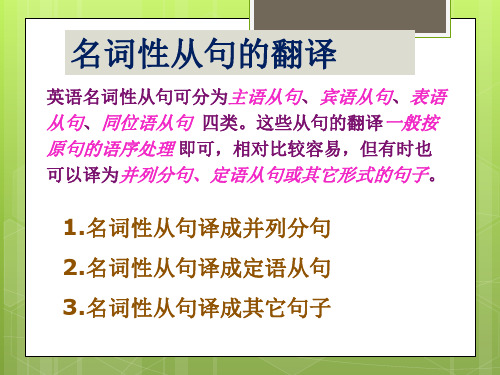
Not long ago the scientists made an exciting discovery that this “waste” material could be turned into plastics. (同位语从句)
名词性从句的翻译
英语名词性从句可分为主语从句、宾语从句、表语 从句、同位语从句 四类。这些从句的翻译一般按 原句的语序处理 即可,相对比较容易,但有时也 可以译为并列分句、定语从句或其它形式的句子。
1.名词性从句译成并列分句 2.名词性从句译成定语从句 3.名词性从句译成其它句子
1.译成并列分句
如果名词性从句包含两层以上的意思,需要把主句与从句 分开译。一般先译出从句,放在句首,然后用汉语的复指 代词“这”“那”,与主句的其他成分连成一句。同位语 从句的翻译与定语从句的翻译非常近似,可以将同位语从 句放在名词前,相当于前置的修饰语,但不必使用定语的 标志“的”字;可以保持原句的语序,译为后置的并列句, 加入冒号、破折号或“这样”、“这…”、“那就是”、 “即”等字眼;也可以改变原句的同位语结构,采用汉语 的无主句或其它方式的译法。
(宾语从句) 如果没有城市的支持, 简直难以想象会有大学、医院和大 企业, 甚至连科学技术也不会有。
4.We fail to learn that pain is the body's way of in-
forming the mind that we are doing something wrong, not necessarily that something is wrong.
名词性从句翻译

名词性从句翻译主语从句1、这个教材是否可用于我们的学校还未讨论过。
(whether)2、使我最感到吃惊的是他态度的突然转变。
(what)3、2010年世博会将在上海举行已成定局。
(that)所有国家都同意,绝不攻击带有红十字标记的任何物体。
(whatever)这次计划将如何执行仍需讨论。
(how)一本书是否畅销取决于诸多因素。
(Whether)(上海市高考题)以it为形式主语的主从复合句他看来不愿意对这件事作进一步的评论。
(seem)你喝了那么多咖啡难怪你睡不着。
(no wonder)据估计,飞到火星上来回一趟需要一年半多的时间。
(estimate) 他碰巧以前做过类似的练习。
(happen)他真的打算一路乘火车去莫斯科。
(true)一切物质都是原子构成的,这是众所周知的事实。
(fact)这种材料能否用在我们工厂还是一个问题。
(question)业已证明他们的建议在一定程度上是合理的。
(prove)原来他根本没出过国,也根本不是华侨。
(turn out)下一班火车什么时候去西藏通知了没有(announce)新产品销路好不好取决于它的质量。
(whether)据报道这种野生植物含有丰富的维生素。
(It)(上海市高考题)宾语从句汤姆希望成为任何一个能与他分享兴趣的人的朋友。
(whoever) 他们祖父当时也算是第一批就在这如今著名旅游胜地的地方安家的。
(what)除非下雨,这位老人每天都散步。
(except)我们问门卫办公室下午五点是否还开着。
(whether)我爸爸说我可以选任何一件看上去适合我的衣服。
(whichever) 我们应该仔细地取出任何可能对年轻人有害的东西。
(whatever)你能否告诉我为什么离开教室时不关灯(why)他除了喜欢偶尔下下棋外没多少别的爱好。
(except)以IT为形式并与的主从复合句不要想当然地认为所有问题通过一次讨论就能解决。
我们认为每个市民都讲礼貌是很重要的。
我们已把问题说清楚,吸烟对女性有更大的危害。
4种名词性从句的翻译方法

• In July 1898, Curie and her husband got a great success that they discovered the radioactive element—polonium.
• 你来不来我不在乎。
• It seemed incredible that she should have lied to us. • 她居然对我们说谎,这真是不可思议。
• It is strange that she should have failed to see her own shortcomings.
works.【主谓结构作定语】
这是关于这台新型电气仪表如何运作的说明。
2024/8/8
12
同位语从句
常用连词that或链接副词来 引导,用以对某个名词作进 一步的解释或说明。翻译时 也可采取不同的方法。
2024/8/8
13
• 方法一:把同位语从句译成汉语联合复句中的一个分句。
• It was from these slender indications of scholarship that Dr. Weldon drew the conclusion that I was worthy to pass into Harrow.
绕着人工湖跑步的一个好处,就是不能抄近路回家。
The fact is that electronic computer are of great benefit to the development of science and technology.【主谓结构】 事实是电子计算机十分有利于科学技术的发展。
名词性从句翻译

2. 宾语从句
EX 5: I made it clear to them that they must hand in their papers before 10 o’clock in the morning. 译文: EX 6: I leave it to your own judgment whether you EX 5: 我向他们讲清楚了的,他们必须在上午十时前 should do it. 交卷。 EX 7: I 我让你自己判断,这件事该不该做。out to EX 6: think it quite true that he ventured Shangri-la. EX 7: 他又冒险去香格里拉了,我觉得这件事千真万 确。 EX 8: What they were asked to do in 10 days, they EX 8: 让他们十天做的事,他们两天就做完了。 finished in two.
4C加入冒号、破折号和“这样”、 “这一”、“即”等
EX9:But considering realistically, we had to face the 译文: fact that our prospects were less than good.(许建 EX9:但在实事求是地考虑一番之后,我们不得不正 平,2008V2:136 ) 视这样的事实:我们的前景并不妙。(许建平,2008V2:136 ) EX10:We have reached the conclusion that practice EX10:我们已经得出这样的结论:实践是检验真理 is 的标准。 the criterion for testing truth.
1. 主语从句
EX5: It is frequently the case that his car breaks down on the highway. 译文: EX6: It is frequently said that computers solve EX5:他的车在路上抛锚,这是常有的事儿。 problems only because they are “programmed” to do EX6: 人们常说,电脑之所以能解决问题,知识只是 so. (许建平,2008V2:134) 因为它们给输入了解决问题的“程序”。 EX7: It doesn’t make much diffeence whether he EX7: 他参不参加会议都没多大关系。 EX8: 她很担忧,她女儿竟然很晚都不睡觉。 attends the meeting or not. (同上) EX8: It worried her much that her daughter shoulLeabharlann stay up so late.
科技英语的翻译——10 名词性从句
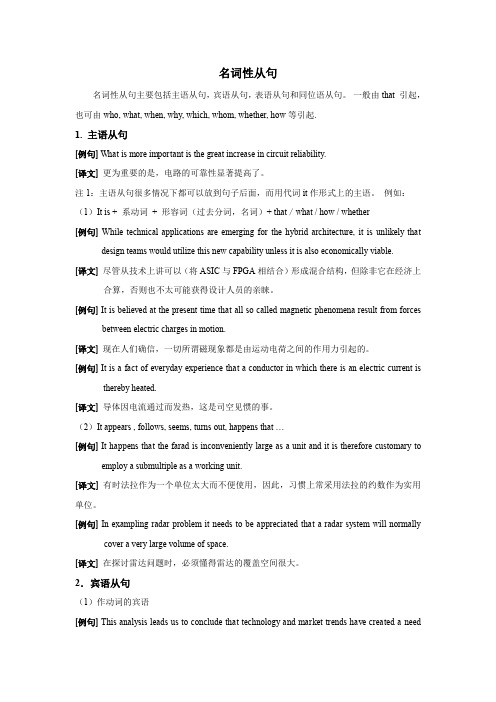
名词性从句名词性从句主要包括主语从句,宾语从句,表语从句和同位语从句。
一般由that 引起,也可由who, what, when, why, which, whom, whether, how等引起.1. 主语从句[例句] What is more important is the great increase in circuit reliability.[译文] 更为重要的是,电路的可靠性显著提高了。
注1:主语从句很多情况下都可以放到句子后面,而用代词it作形式上的主语。
例如:(1)It is + 系动词+ 形容词(过去分词,名词)+ that/what / how / whether[例句] While technical applications are emerging for the hybrid architecture, it is unlikely that design teams would utilize this new capability unless it is also economically viable.[译文] 尽管从技术上讲可以(将ASIC与FPGA相结合)形成混合结构,但除非它在经济上合算,否则也不太可能获得设计人员的亲睐。
[例句] It is believed at the present time that all so called magnetic phenomena result from forces between electric charges in motion.[译文] 现在人们确信,一切所谓磁现象都是由运动电荷之间的作用力引起的。
[例句] I t is a fact of everyday experience that a conductor in which there is an electric current is thereby heated.[译文] 导体因电流通过而发热,这是司空见惯的事。
名词性从句的翻译

“It is + 形容词+that 从句”
译法:先将“that从句”单独翻译出来,然后加上 “(这是)很+形容词”的结构。 有时将形容词转译成副词短语,会使译文更符合汉语 的表达习惯。
1.It was really astonishing that she refused to talk to her parents. A.她拒绝和父母交谈,这真令人吃惊。 B. 我们很可能要迟到一会儿。 2. It is strange that he should have failed to see his own shortcomings. A. 他竟然没有看出自己的缺点,这很奇怪。 B. 真奇怪,他竟然没有看出自己的缺点。
Translation of Nominal Clauses
I. Translation of Subject Clauses II. Translation of Object Clauses
III. Translation of Predicative Clauses
IV. Translation of Appositive clauses
(三)Convert into an object clause and put it after the noun.
There are clear indications that the war will soon be over. 有明显的迹象表明战争即将结束。
(四) Use punctuation marks or specific words
麻烦的是他们缺钱。 3.This is where the shoe pinches. 这就是问题的症结所在了。
IV. Appositive clauses
名词性从句的翻译
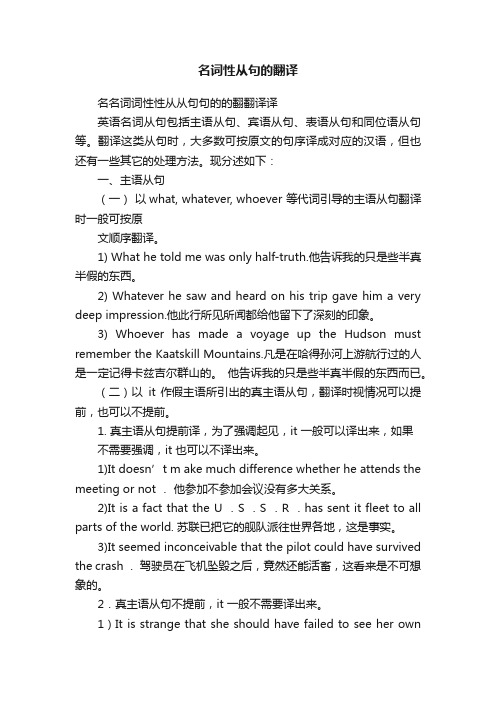
名词性从句的翻译名名词词性性从从句句的的翻翻译译英语名词从句包括主语从句、宾语从句、表语从句和同位语从句等。
翻译这类从句时,大多数可按原文的句序译成对应的汉语,但也还有一些其它的处理方法。
现分述如下:一、主语从句(一)以what, whatever, whoever 等代词引导的主语从句翻译时一般可按原文顺序翻译。
1) What he told me was only half-truth.他告诉我的只是些半真半假的东西。
2) Whatever he saw and heard on his trip gave him a very deep impression.他此行所见所闻都给他留下了深刻的印象。
3) Whoever has made a voyage up the Hudson must remember the Kaatskill Mountains.凡是在哈得孙河上游航行过的人是一定记得卡兹吉尔群山的。
他告诉我的只是些半真半假的东西而已。
(二)以it 作假主语所引出的真主语从句,翻译时视情况可以提前,也可以不提前。
1. 真主语从句提前译,为了强调起见,it 一般可以译出来,如果不需要强调,it 也可以不译出来。
1)It doesn’t m ake much difference whether he attends the meeting or not .他参加不参加会议没有多大关系。
2)It is a fact that the U .S .S .R .has sent it fleet to all parts of the world. 苏联已把它的舰队派往世界各地,这是事实。
3)It seemed inconceivable that the pilot could have survived the crash .驾驶员在飞机坠毁之后,竟然还能活畜,这看来是不可想象的。
2.真主语从句不提前,it 一般不需要译出来。
名词性从句翻译
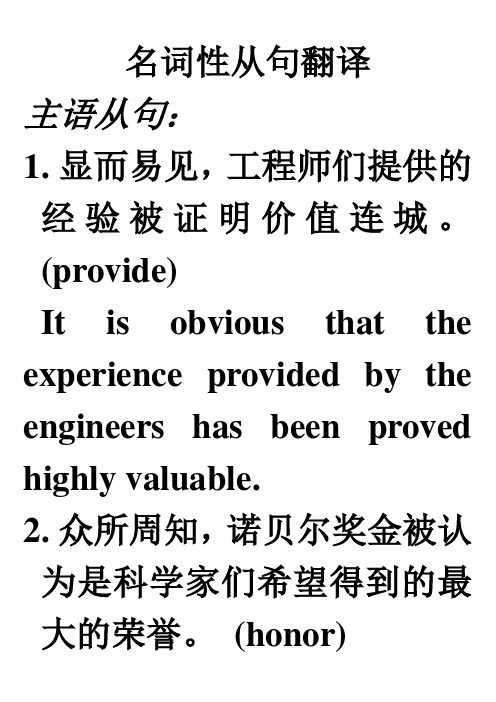
名词性从句翻译主语从句:1.显而易见,工程师们提供的经验被证明价值连城。
(provide)It is obvious that the experience provided by the engineers has been proved highly valuable.2.众所周知,诺贝尔奖金被认为是科学家们希望得到的最大的荣誉。
(honor)It is well known that a Nobel Prize is considered the greatest honor that a scientist can wish for.3.这次会上做出的决定是否可行尚待证明。
(remain)It remains to be proved whether the decision made at the meeting will be practical.4.你直接回家还是在此逗留一两天对我来说都没有关系。
(matter)It doesn’t matter much to me whether you go straight home now or stay here for a couple of days.5.必须指出,学生佷有必要了解世界上每天发生的事情。
(inform)It must be pointed out that it is quite necessary that students should be informed of what is going on in the world every day.6.说实话,人们通常认为学生在校学习的每一门课程都各自有用。
(thought)To be honest, / To tell you the truth, it is generally thought that every subject that students learn at school is useful in its own way.7.人们普遍认为,广泛阅读能使我们了解到我们感兴趣的东西。
- 1、下载文档前请自行甄别文档内容的完整性,平台不提供额外的编辑、内容补充、找答案等附加服务。
- 2、"仅部分预览"的文档,不可在线预览部分如存在完整性等问题,可反馈申请退款(可完整预览的文档不适用该条件!)。
- 3、如文档侵犯您的权益,请联系客服反馈,我们会尽快为您处理(人工客服工作时间:9:00-18:30)。
名词性从句的翻译
Substantive Clause Translation
包括主语从句、表语从句、宾语从句及同位语从句四类。
重点讲解同位语从句的翻译。
尤其是避免“即”、“:”、“——”之类的译法。
主语从句及翻译
(一)以what, who, whether, that, where, why, how, when等代词引导的主语从句翻译时一般可按照原文顺序翻译。
例如:
Why metals can conduct electricity is an interesting problem.
金属为什么能导电是一个有趣的问题。
That energy can be neither created nor destroyed is a very important law in physical science.
能量既不能创造也不能消灭是物理学的一条很重要的定律。
Whether an organism is a plant or an animal sometimes taxes the brains of a biologist. 一种生物是植物还是动物,有时使生物学家很伤脑筋。
When it was first invented is not known.
它最初是什么时候发明的,现在还不知道。
Where the water has gone can easily be answered.
水到哪里去了,这很容易回答。
(二)形式主语it +谓语+ that (whether)引导的从句,汉译时一般先译从句再译主句。
例如:
It is a matter of common experience that bodies are lighter in water than they are in air.
众所周知,物体在水中比在空气中轻。
It is no longer a question whether man can fly to the moon.
人能否飞上月球,现在已不再是什么问题了。
It is certain that we shall produce this kind of engine.
毫无疑问,我们将生产这种发动机。
表语从句及翻译
表语从句位于主句的连系动词之后,引导表语从句的从属连词和引导主语从句的从属连词相同。
汉译时,顺序不变。
例如:
The question is how the people can find an effective way to store the sun's heat.
问题在于人们怎样才能找到一种有效的方式来储藏太阳热。
This is what the equation means.
这就是此方程式的含义。
That's why the plants absorb water from the soil.
这就是植物从土壤中吸收水分的原因。
宾语从句及翻译
宾语从句既可以是动词的宾语,也可以是某些形容词或介词的宾语。
宾语从句也可以出现在由it作形式宾语的句子中,汉译时,顺序一般不变。
例如:
Scientists have long predicated that computers would one day help speed up the arduous task of translating texts.
科学家们早已预言,总有一天计算机将帮助我们加快艰巨的文字翻译工作。
We all know that cigarette smoking is hazardous to health and that alcohol abuse can kill.
我们都知道吸烟对健康有害,我们也知道酗酒会危害人的生命。
Nutritional experiments have made it evident that vitamins are indispensable for one's health and growth.
营养实验证明,维生素对人们的健康和生长是不可缺少的。
.
同位语从句及翻译
英语中的同位语从句是用来说明它前面的某个名词的从句,它与其所修饰的名词在地位上是同等的。
同位语从句常用that, whether 或if引导,它们在从句中不充当任何句子成分。
汉译时可灵活处理,根据具体情况可采用合译、分译或转换等多种方法。
例如:
The suggestion that we should develop the natural resources in this region has been discussed.
关于我们应该开发本地区自然资源的建议已经被讨论过了。
There is no possibility that human beings will ever be controlled by robots.
人类不可能受机器人控制。
There is general acknowledgment that characteristics of an individual are a result of an
interaction of genetics and environment.
众所周知,某一个体的特性是遗传和环境相互作用的结果。
There is no doubt that animal viruses can jump into humans.
毫无疑问,动物病毒能进入人体。
So far there is no proof that UFOs or spaceships from other planets do exist.
究竟有没有不明飞行物或来自其他行星的宇宙飞船,迄今为止尚无法证实。
经常与同位语从句连用的单词或短语包括:idea, fact, news, rumor, hope, belief, thought, doubt, proposition, suggestion, advice, agreement, message, probability, certainty, likelihood, evidence, on condition, on the supposition, on the ground(s), on the understanding, with the exception, in spite of the fact等。
